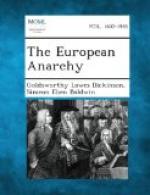All these gentlemen appeared to be convinced partisans of peace.... According to them, the tranquillity of Europe had not been for a moment seriously menaced during the crisis of Agadir.... Industrial Germany required to live on good terms with France. Peace was necessary to business, and German finance in particular had every interest in the maintenance of its profitable relations with French finance.[3] At the end of a few months I had the impression that these pacifists personified then—in 1912—the most common, the most widely spread, though the least noisy, opinion, the opinion of the majority, understanding by the majority, not that of the governing classes but that of the nation as a whole (p. 172).
The mass of the people, Beyens held, loved peace, and dreaded war. That was the case, not only with all the common people, but also with the managers and owners of businesses and the wholesale and retail merchants. Even in Berlin society and among the ancient German nobility there were to be found sincere pacifists. On the other hand, there was certainly a bellicose minority. It was composed largely of soldiers, both active and retired; the latter especially looking with envy and disgust on the increasing prosperity of the commercial classes, and holding that a “blood-letting would be wholesome to purge and regenerate the social body”—a view not confined to Germany, and one which has received classical expression in Tennyson’s “Maud.” To this movement belonged also the high officials, the Conservative parties, patriots and journalists, and of course the armament firms, deliberate fomenters of war in Germany, as everywhere else, in order to put money into their pockets. To these must be added the “intellectual flower of the universities and the schools.” “The professors at the universities, taken en bloc, were one of the most violent elements in the nation.” “Almost all the young people from one end of the Empire to the other have had brought before them in the course of their studies the dilemma which Bernhardi summed up to his readers in the three words ‘world-power or decadence.’ Yet with all this, the resolute partisans of war formed as I thought a very small minority in the nation. That is the impression I obstinately retain of my sojourn in Berlin and my excursions into the provinces of the Empire, rich or poor. When I recall the image of this peaceful population, journeying to business every week-day with a movement so regular, or seated at table on Sundays in the cafes in the open air before a glass of beer, I can find in my memories nothing but placid faces where there was no trace of violent passions, no thought hostile to foreigners, not even that feverish concern with the struggle for existence which the spectacle of the human crowd has sometimes shown me elsewhere.”




